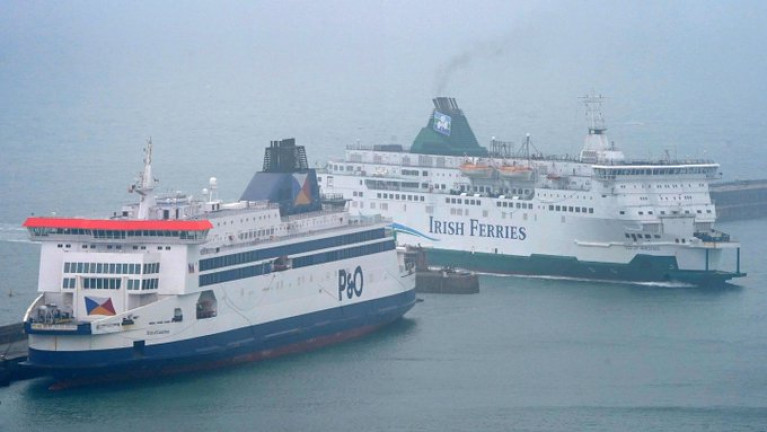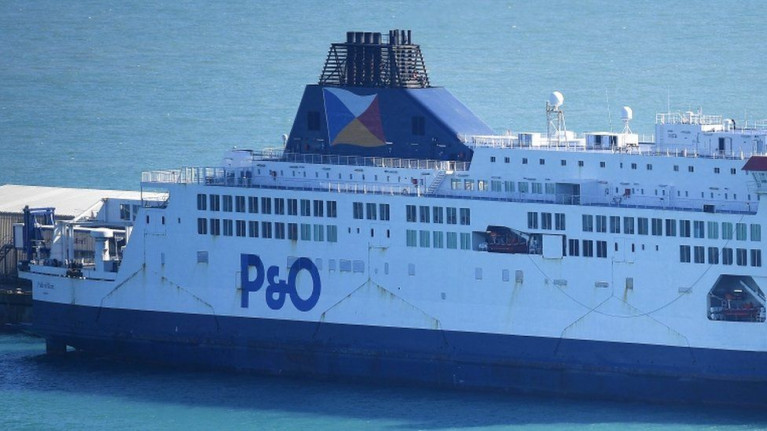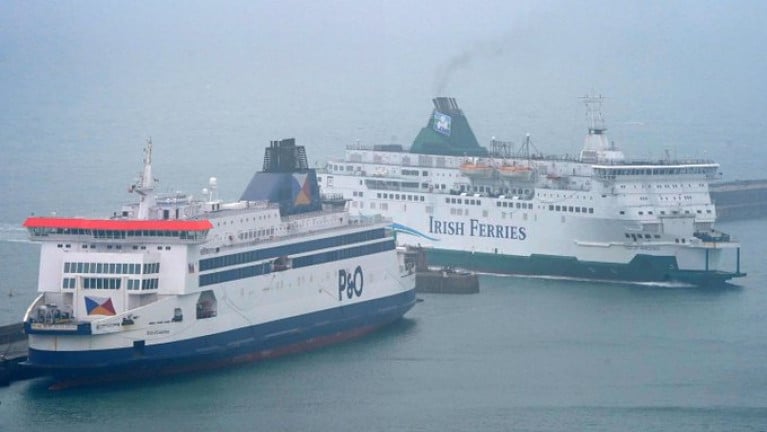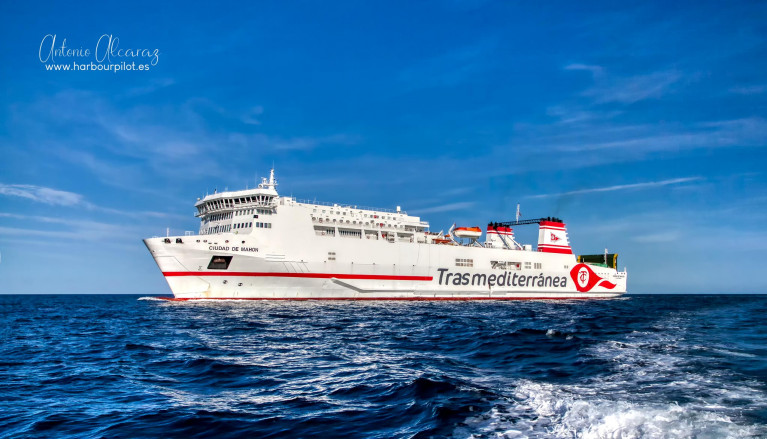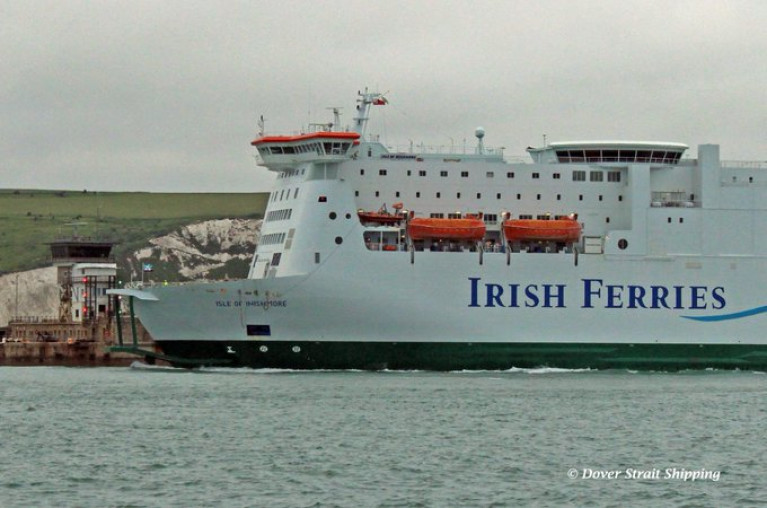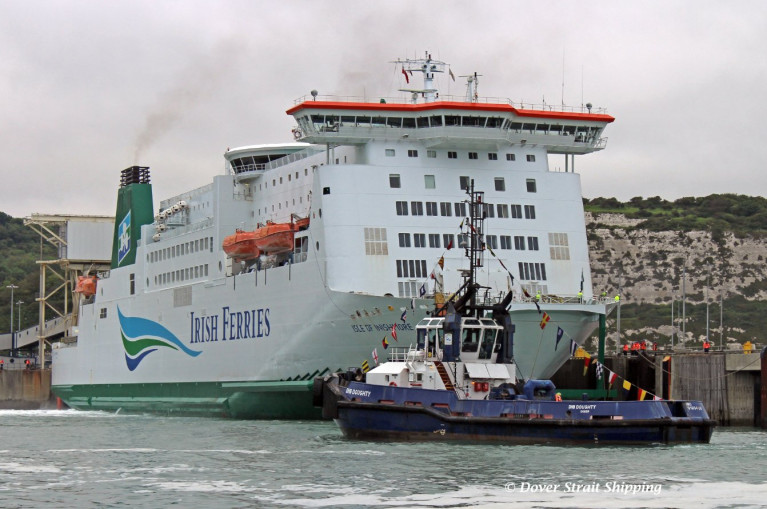Displaying items by tag: DoverCalais
Dover-Calais Operators’ DFDS and P&O Ferries Advise Passengers During Calais Port Workers’ Strike
Strait of Dover ferry sailings to Calais are being affected by strike action in France today, (14 Dec.) an operator has warned.
The Danish company, DFDS says because of the effect on the Dover-Calais route, it is offering sailings on their alternative route to northern France, Dover-Dunkirk.
French workers began the strike action and is expected to last 24 hours.
Commenting on the strike, a DFDS spokesman said: “Strike action by port workers in Calais is affecting sailings on DFDS' Dover-Calais route today.
P&O say on X that its sailings from Dover up to 3.25pm are running on time so far but advise passengers to continue checking tweet feeds.
More from KentOnline on the disruption.
As for the third ferry operator, Afloat adds on the UK-France link, Irish Ferries, which at time of writing, is not disrupted according to the company’s website with information on sailing updates.
Hybrid Newbuild P&O Pioneer for Dover-Calais Service Arrives At UK Port for the First Time
A multimillion-pound hybrid newbuild ferry for P&O Ferries Dover-Calais service has arrived in the Kent port for the first time yesterday.
P&O Pioneer, the first of twin newbuilds that is joining P&O Ferris fleet, arrived in the Port of Dover in the morning at 8am.
Combined the newbuilds costing £230 million, will replace P&O’s older fleet and significantly the ferries will be the first double-headed vessels on the UK-France.
By having this design, the ferries will reduce time in port when loading and unloading by virtue of not having to turn around in port. In addition to saving o fuel and reduced emissions.
P&O Pioneer is scheduled to make its first journey on the Strait of Dover route on 19 June.
After the ferry operator announced the order in 2020, P&O said the new ferries would cut fuel use by 40% "through a combination of fuel and battery propulsion".
The twins built by the Guangzhou Shipyard in China for P&O who claim their ships are designed with the capacity to be carbon neutral in the future based on the twin assumptions that there are more electric shore charging stations in ports and batteries.
More from KentOnline on the entry of the first of the newbuilds.
Dublin based operator, Irish Ferries has confirmed that one of its UK-France service ferries had encountered difficulties yesterday (3 March) evening following a small fire that broke out on board at 5.30pm.
The ferry company in a statement said the crew on board the 163m long Isle of Innisfree "were alerted to a small fire in the ship's engine room while the ship was sailing from Dover to Calais".
The 199I built ferry is one of three that Irish Ferries operate on the English Channel and where the 28,838 gross tonnage ferry had departed the port in Kent at 5pm.
The statement added that its crews train regularly to deal with incidents at sea and "the fire has now been extinguished".
At the time of the incident the Cypriot flagged Isle of Innisfree was carrying 94 passengers and 89 crew and that all are safe and accounted for.
The UK coastguard was informed and dispatched three lifeboats as a precautionary measure.
More from RTE News on the ferry that arrived safely into Calais after a tug according to BBC News had towed the ferry into port.
Afloat adds that while the Isle of Innisfree is off service, the route is reduced from three ferries down to a just a single ship the Isle of Inishmore. This is because Irish Ferries third Dover-Calais vessel, Isle of Inisheer is away for dry-docking at Harland & Wolff, Belfast.
Isle of Innisfree is no stranger to the Strait of Dover having served originally as Prins Philip for Belgium operator, RMT on the Dover-Ostende route.
Since 1992 the ferry has changed ownership several times until the Irish company acquired the ferry from DFDS, a rival on the French route also served by P&O Ferries.
Strait of Dover Ferries Will Go Electric, Say Operators
A radical and ambitious proposal to turn the Dover Strait green and to allow only fully electric ferries on the short-sea English Channel crossing will be put to the government today.
The plan is for the routes between Dover and Calais and Dunkirk to become the first zero-carbon shipping corridor in the world, with a new generation of ferries making the 22-mile crossing on battery power and the ports replacing their fuel bunkers with industrial-size ship recharging points.
If the proposal is agreed, it is likely that in time there will be a corollary mandate to demand that heavy goods and passenger vehicles using the port and ferries also will have to be lower-emission.
To read more The Times, has further coverage.
The UK-France route is operated by DFDS, P&O Ferries and Irish Ferries which entered the Dover-Calais market almost a year ago.
At the Port of Dover a second P&O ferry has passed its safety inspection, the Maritime and Coastguard Agency (MCA) has said.
The Pride of Kent can now join the Spirit of Britain, which the MCA cleared to sail on 23 April, after it was detained for two weeks.
Safety fears were raised after P&O replaced nearly 800 seafarers with cheaper agency staff in March.
P&O tweeted on Monday evening that it would be running a one ship schedule until 12 May.
A spokesperson for the MCA said: "The Pride of Kent has been released from detention and can commence operations when P&O Ferries are ready."
They added no further inspections of P&O ferries are planned at the moment, but will be carried out at the request of the company.
BBC News has more here.
Irish Ferries and DFDS Dover-Calais Crossing Times for 27 April as P&O Resumes Freight-Only Services
Ferry company P&O has resumed freight services on its Spirit of Britain ship, but passenger crossings remain suspended.
As KentLive reports the vessel left Port of Dover on Tuesday evening (26 April).
Spirit of Britain was detained by the Maritime and Coastguard Agency (MCA) on 12 April after safety issues were found, but was cleared to sail last Friday. The ferry company sacked nearly 800 seafarers with no notice on March 17, replacing them with cheaper agency workers.
P&O Ferries has not operated between Dover and Calais since the mass sackings.
Passenger services are expected to resume early next week. At the moment, the only passenger services are being provided by Irish Ferries and DFDS.
For more including crossing times from these ferry operators, scroll further down from this link.
Irish Ferries to Grow Frequency by 50% with Third Dover-Calais Ship
Irish Ferries has announced the addition of a third ro-ro ferry to its Dover to Calais route as Afloat reported last week.
The ship is expected to enter service in the first quarter of 2022, joining the Isle of Inishmore and the recently announced Isle of Innisfree.
The secondhand tonnage, Ciudad de Mahon, to be renamed in the coming weeks, was built in 2000 by the by Astilleros Espanoles S.A. (AESA) shipyard in Spain and originally delivered as Northern Merchant. As Afloat also previously alluded, the ropax is no stranger to the short straits, having originally operated on the Dover - Dunkirk route following delivery.
The ferry has the capacity to carry up to 589 passengers and over 90 freight vehicles. Facilities for freight drivers/passengers involve a self-service restaurant, café/bar, onboard duty-free shop and spacious outdoor decks.
Andrew Sheen, Irish Ferries Managing Director, said: “The addition of a third vessel on our Dover / Calais route will allow us to offer a departure from either Dover or Calais every 90 minutes. This is a further sign of our commitment to this route and will offer customers even greater choice along with the capacity, frequency and reliability that is required to service this important route between GB and France”.
Perhaps, Afloat adds that this third ferry to the UK-France route will be renamed Isle of Inishturk? (originally B+I Line's Leinster) which served briefly under this name when operating Rosslare-Pembroke.
ICG Acquire Another Ferry for Irish Ferries Dover-Calais Route to Enter Service in 2022
The Irish Continental Group (ICG) which owns Irish Ferries, has announced yet another recent acquisition, this time a Spanish-Balearic Islands passenger ro-ro ferry which will be their third ship to enter service on the Dover-Calais route, writes Jehan Ashmore
ICG entered into the agreement with Trasmed GLE for the purchase of the ropax ferry Ciudad de Mahón. Afloat tracked this morning the ferry at Palma de Mallorca, the port on the largest of the Balearics, Majorca from where the ropax serves the Spanish mainland port of Valencia.
Title to the 22,152 tonne Ciudad de Mahón will transfer to ICG on delivery which is expected to be implemented by late January 2022 and with the ro-pax ferry scheduled to commence services on the UK-mainland Europe route in the first quarter of next year.
The yet to be announced renamed vessel will serve the UK-France route after dry docking and rebranding changes. As Afloat previously reported, similar work is currently taking place with the former DFDS Calais Seaways (since renamed Isle of Innisfree), following ICG's purchase and delivery earlier this month, though is due in early December to join Isle of Innishmore which launched Irish Ferries debut on the route during the summer.
The newly acquired vessel was built in 2000 as Northern Merchant (Afloat adds for UK concern, Cenargo Group) by Astilleros Espanoles S.A. (AESA), Spain, to serve coincidentally out of Dover but running to Dunkerque with a charter to NorfolkLine. The ferry was one of a quartet of 'Race Horse' series built in Seville, with Midnight Merchant also on the Strait of Dover run, whereas the remaining pair served a Dublin-Liverpool service.
Passenger capacity is for 589 while freight is for 91 units of the ferry also previously named as Zurbarán. This will further boost freight capacity on the tightly competitive short-sea UK-mainland Europe link. The route also forms Irish Ferries 'landbridge' UK services, by connecting Ireland and the EU via ports in Wales.
Introduction of these two ferries by ICG, represents a total investment of €35.5m, alongside the Isle of Inishmore which completes previously announced plan by the Dublin based company to introduce three vessels on the premier Dover - Calais route.
With the third ferry in service, this will allow Irish Ferries to offer up to 30 sailings daily on the route with sailings in each direction approximately every 90 minutes.
Irish Ferries Voted ‘Best Ferry or Fixed Linked Operator’ at UK Group Leisure & Travel Awards
Irish Ferries has been awarded the title of ‘Best Ferry or Fixed Linked Operator’ for the third consecutive year at the UK Group Leisure and Travel Awards 2021 – a momentous achievement following a challenging year for global travel.
The annual awards ceremony recognises the very best providers, attractions and destinations for groups, as voted for by readers of Group Leisure & Travel. This year’s event took place virtually, and was hosted by British presenter and actress, Julie Peasgood.
Whilst traditionally known for its Irish Sea routes between Holyhead – Dublin Port and Pembroke – Rosslare Europort, Irish Ferries recently extended their network to include Dover – Calais.
In June, Irish Ferries launched their Dover – Calais route, serviced by the trusted ‘Isle of Inishmore’, brings even more choice for customers travelling across the channel. Frequency on this route is soon to be increased with the introduction of a second vessel in the coming months.
Irish Ferries encourages customers and group partners to “Sea Travel Differently” – whether for group tours, business trips, or planning the holiday of a lifetime. The company prides itself on providing high quality hospitality and service, exceptional on-board amenities, first-class facilities for coach drivers, great value sailings, and has a dedicated groups support team and manager to oversee enquiries via email and phone.
Commenting on the award, Marie McCarthy, Passenger Sales Manager UK & Ireland, said “Irish Ferries is proud to have been awarded this title for the third year running, particularly as this succeeds the launch of our new Dover – Calais route, connecting this critical market now to both Europe as well as Ireland.
“Group travel is a very important market for us, for which, over the years, we have built our reputation as a specialist. This award formally recognises our continued efforts to provide our groups customers with a wonderful experience on a first-class fleet, with Irish hospitality at the centre of our offering.
“Group Leisure & Travel has a loyal readership which values the publication’s preferred providers and we will continue to work closely with them to ensure our standard of service remains high. Thank you to all readers who voted for us – we cannot thank you enough!”
Dublin based operator, Irish Ferries saw its cruiseferry Isle of Inishmore this morning set sail on an inaugural sailing from the Port of Dover to Calais in direct competition with P&O Ferries and DFDS.
As Afloat previously reported, tickets went on sale in advance of the new UK-France service, which extends Irish Ferries network of award-winning services. In addition to providing customers with a new operator choice for travelling across the Channel, first announced by ICG in March.
Irish Ferries encourages customers to “sea travel differently” – whether for holidays, business trips, reuniting with loved ones, or planning the road trip of a lifetime. With award-winning hospitality and service, onboard duty-free shopping and extensive amenities to make the journey even more special, the holiday really does begin once passengers’ step onboard.
The Isle of Inishmore has undergone extensive refurbishments for the new service – including an upgraded Club Class Lounge, with spectacular 360-degree sea views, and refreshed, spacious passenger areas. The 90-minute crossing is a breeze, with plenty of amenities onboard. Passengers can avail of free WiFi, re-fuel in Boylan’s Brasserie or Café Lafayette, or let the kids enjoy the soft play area.
With new duty-free allowances post Brexit, it’s the perfect opportunity to stock up in the Duty Free shop, or even plan ahead on purchases, with an innovative, online Click & Collect service. Freight drivers can also enjoy the comfortable facilities including a drivers lounge and dedicated new showers.
Andrew Sheen, Managing Director at Irish Ferries, said: “Our newly-launched route between Dover and Calais brings even more choice for freight customers who can now experience our outstanding service while travelling between the UK and France. We're delighted to bring a little bit of Ireland to this route, and after months of travel limitations, we know that people are very eager to see family and friends, re-ignite business relations, and escape their everyday and take a much-needed holiday. We are in the business of connectivity and want to enable those special memories to be created once travel is permitted again.”
Doug Bannister, Chief Executive of the Port of Dover, said: “We offer a very warm welcome to Irish Ferries and are delighted to see their operations commence from the UK’s busiest international ro-ro port. There has been considerable work by Port of Dover and all parties associated with this new service launch to get prepared for this day, and we are pleased to see all of those efforts come to fruition. We wish Irish Ferries every success for their new venture with us”
Ferry travel makes for a more relaxed holiday option, with the freedom to pack the car with unlimited luggage, bring pets along, and travel exactly where you want in the comfort of your own car. The Flexibility Option from Irish Ferries also offers additional peace of mind if customers need to change bookings at the last minute.
With Irish Ferries ‘Travel Safe’ programme, customers can also travel in confidence; checking in from the security of their own car, sailing with plenty of space in communal areas for natural social distancing onboard, and take in the fresh, sea air from outdoor decks.
Fares start from just £69 for a car and up to nine passengers, and ferries will operate with up to 10 daily crossings.


























